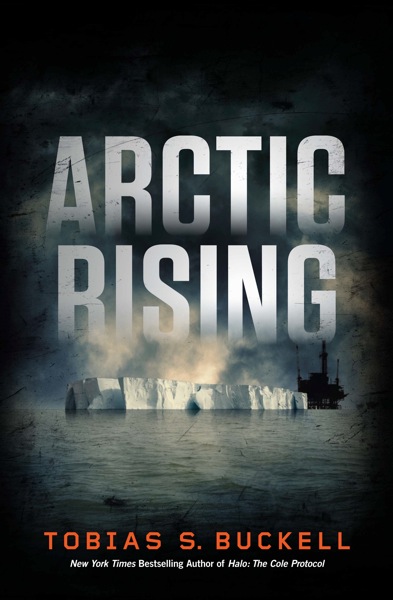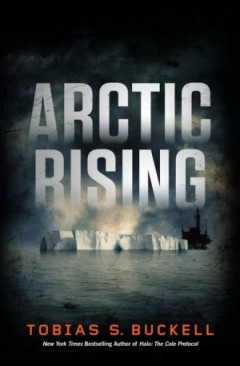
I have previously read and reviewed Tobias S. Buckell’s Crystal Rain and Ragamuffin, both of which I enjoyed. On the other hand, I am skeptical of alarmist claims about global warming. So it was with some ambivalence, a mixture of excitement and trepidation, that I began reading my advance review copy (ARC) of Buckell’s latest novel — his first foray into techno-thrillers — Arctic Rising (Tor, 2012). Though he had me worried a time or two, I was pleasantly surprised and glad I read it.
Arctic Rising is set in the near future — the Earth is warmer and the Arctic Circle is largely ice-free year-round. States and corporations are racing to take advantage of the new oversea North Pole trade route and the untapped resources made accessible by the receding ice. As you might expect, this is a situation ripe for political conflict, and environmentalists are none-too-happy with the change in climate either.
Buckell handles the environmental angle fairly gracefully. The global warming issue mainly shows up as background, for the setting, and as a plot device. Speaking of the plot, don’t read the GoodReads description of the book if you prefer to avoid major spoilers.
For the most part he avoids thumping you over the head with an ideological bludgeon. The one time I got really worried he was going to spoil the book for me was about 3/4ths of the way through when the co-founders of a green energy corporation go off on a talking point–ridden tag-team duologue, but let’s just say that the impact was lessened by the way they were subsequently portrayed.
Unlike many environmentalists I’ve encountered, Buckell has no difficulty recognizing that global warming would be harmful to some but also beneficial to others; that, contrary to the frequent warnings of doom and gloom, it wouldn’t be all bad. Sea levels would rise. But rising temperatures would open up more arable land in the north. While already hot regions might get detrimentally hotter, colder climes would get warmer as well and benefit from longer growing seasons. Resources previously buried under tons of ice would become open to exploitation. Moreover, once people have adjusted to the warmer temperatures, a return to colder temperatures of previous decades would result in winners and losers as well. There are no neutral climate changes; any changes in the Earth’s climate will have both positive and negative consequences.
As Arctic Rising opens, we are introduced to our sole viewpoint character — one Anika Duncan, a mixed-race Nigerian airship pilot for the chronically underfunded United Nations Polar Guard. As the story progresses we gradually learn more about her colorful past as a child soldier and later a mercenary pilot. When offered her dream job by the UN, prior to the start of the action, Anika had jumped at the chance for a safer, less eventful career doing what she loved.
And things were nice and quiet for Anika… until a hunch leads her to take a second look at a freighter. When something radioactive in the ship sets off her neutron scatter camera, Anika, thinking they are just nuclear waste dumpers, orders them to prepare for boarding. But the crew respond by blowing her and her co-pilot, Tom, out of the sky and into the still-frigid waters of the Arctic. Something bigger than nuclear waste dumping is going on here.
Buckell launches us into a brisk thriller pace in the opening chapters and doesn’t let up. Who were the attackers? Who is behind them? And what secrets were they trying to protect? Anika is determined to find out. But her life and career start to unravel as mysterious forces try to destroy her evidence and silence her for good. The plot takes us through some twists and turns. Anika’s decisions are complicated by a number of characters whose motives and allegiances are uncertain.
Along the way Buckell introduces a diverse supporting cast of characters that lend Anika their aid. Among the most notable is Prudence Jones, who will remind Buckell fans of badass Pepper. Buckell even gives a nod to Nanagada. Prudence, or Roo (oddly), is a former MI6 operative of Caribbean descent turned freelance spy. He and other intelligence contractors for the Caribbean nations make clever use of the internet and social networks to perform first-rate work on a budget. And then there’s Violet, the bar owner and drug dealer with an interesting past of her own and a romantic interest in Anika that has gone reluctantly unrequited on Anika’s part.
What makes Arctic Rising a techno-thriller are mainly the near-future setting and the central maguffin that I don’t want to spoil for you. Suffice to say that it’s a game-changing piece of technology that is linked to the environmental premise of the setting and that has disturbing military applications. There are few other technological advances in the book that stand out aside from the ubiquity of wireless key fobs for starting vehicles and internet-connected glasses with heads-up displays (HUDs). It would certainly be cool to have some of those “Google Goggle Goggles.” Oh, and a lie detector with the disturbing ability to image your brain.
Buckell mishandled one aspect of technology in the novel for me though, an old piece of technology at that. As a gun owner with some private and military training, who immersed myself in gun culture for a time when I bought my first guns, it bugged me to keep seeing characters with military training refer to the ammunition storage-and-feeding devices for their firearms as clips.

The pistols and rifles handled by characters in the novel use magazines, not clips.

That quibble aside, Arctic Rising is a fast-paced, entertaining novel that I would recommend even those who are skeptical of global warming read. Buckell is for the most part not heavy handed with the environmentalism. It’s a fun read. And the pay off at the end is particularly worth it.
There are things in Anika, Roo, Violet, and other characters for libertarians to like throughout the novel, but it is toward the end that some of the more interesting stuff is revealed.
The final action scenes take place in the independent city of Thule, the Hong Kong of the North Pole, which clings to the last bit of ice in the Arctic. About Thule, one character remarks, “Even if you declare war on them, if you pay the harbor fee and entrance visa, they’ll happily trade with you.” In Thule everyone is likely to be armed and they don’t mind if you are carrying as you come through their airport or harbor.
Buckell has Anika describe Thule confusingly and contradictingly as a “replication of relatively unfettered laissez-faire mercantilism run amok,” a “place for the edges of Arctic society to experiment and innovate.” The phrase “run amok” makes it sound like a bad thing, and mercantilism is anything but unfettered laissez-faire markets, but otherwise Thule sounds great!
The city is privately owned by the Thule Corporation, a consortium of oil companies, if I remember correctly, that imposes minimal rules on the many entities to whom it licenses space. The main rules being that you have a right to travel anywhere in Thule you wish, you may leave Thule whenever you wish, and hindrance of free movement of any other person is prohibited. The Thule Corporation leaves it to each of the leasing demesnes to set up their own political and legal system beyond that, which has led to some 40-odd mini-countries in Thule,
each an experiment in whatever its founders considered the most optimal way to thrive. Violation of any law that doesn’t involve physical bodily harm to the victim results in demesne expulsion. Violating a standing demesne restraining order results in revocation of Thule citizenship and banishment.
Another interesting aspect of Thule is the city’s reaction to blockades: they go into what they call “full little brother mode” — 100% two-way surveillance. No secrets. Everything is broadcast out for the whole world to see. With this radical public transparency, or sousveillance, the blockading power must think twice before undertaking any violent actions.
Buckell also seems to have a fetish for participatory budget and radical municipal democracy might interest some. About one Thule demesne:
Peary’s modeled after Brazilian participatory budget and radical municipal democracy, with a few variants. People committee-vote on all municipal budget matters and draw up the budgets and where tax money goes; municipal employees serve as expert consultants, but have no say in the budget or projects list, they are contractors that execute what the voters decide every quarter needs done. Stops backscratching and corruption. These guys take it a step further: there are no municipal employees, municipal spots are volunteer positions. If you can’t find the time, then you can pay to have a subcontractor do your duty. But it means you’re stuck with waiting for damn amateurs to run out here.
That’s a damn sight more attractive than modern nation-states, let me tell you. But it’s not quite my ideal.

The most rewarding part of the book for me as a libertarian, however, is the portrayal of both the environmentalists and state agents as meddling do-gooders with a tyrannical impulse who think they, and only they, have all the answers and can impose them on the rest of the world from the top-down through the threat or use of initiatory physical force. The way Buckell links the environmentalists with Bush-style, self-righteous, preventive war doctrine is priceless and insightful.
SPOILER WARNING
To quote Anika at length:
“Men like you use words like ‘preemptive’ and ‘just’ and chew through lives. You even destroy countries. You run around, playing your games, imagining you are gods moving the little people around on boards like game pieces. And you are right, you are not human, you are something else. But it is not gods. I flew enough of your kind into conflict zones to know the type. You know why natural resources are the curse of a developing nation? Because the rebel army meets someone like you, who parachutes into the jungle, and they say when they get control of the resources, they’ll cut you a deal. And so you give them arms, or a loan, because maybe you don’t like the current government. And the brutal flip-flopping of overthrow, violence, and overthrow continues. I know you, Gabriel. You’re the kind of man who thinks it makes any sense to smuggle a nuclear missile around the world to kill an engineering project.”
Gabriel shifted the Diemaco. “You ignore the very simple fact that I was right, though. What exactly is wrong with you that you can’t just accept that?”
“A broken clock is correct twice a day,” Anika said. “You are correct now. But you will always be doing things like this around the clock. That is how you are. Regular people, we are reactive. Hit us, we hit back. But you walk around looking for people to hit ahead of time. You see?”
“You would just let Ivan Cohen dominate you all, then?” Gabriel sighted down the rifle and fired off a full burst at the laptop. Pieces of plastic and circuit board flew off into the air as it was destroyed.
“No,” Anika said. “Your people and him, they are the same. They dictate from on high. They are always convinced that they, and only they, have all the answers. They have to force the issue. The ends justify the means. Get rid of your masters and him, the rest of us get on with living. But since we’re stuck with each other, we have this mess. Right?”
Hear! Hear! You tell him, Anika!
Speaking of Ivan Cohen, he’s one of the two ranting green-corporation co-founders I mentioned above. One of the things that saved the novel for me after their ideological rant is that he turns out to be a total anti-human nutjob. His partner, Paige Greer, manages to retain something human left in her but must still be delusional and slightly mad to explain her blind loyalty to Cohen and their self-righteous plan to terraform the Earth back to some arbitrary static point in its climatic history.
Stabilization is Chaos: “Monetary policy all over the world has followed the advice of the stabilizers. It is high time that their influence, which has already done harm enough, should be overthrown.”
— F.A. Hayek, 1932
The long speech Cohen and Greer give is laden with misleading talking points: people starving in a country with plenty of arable land; the true cost of pollution isn’t factored into the price of goods but rather is hidden in the taxes we pay as government must cover it, so consumers are incentivized to make bad choices; the Earth’s climate could be at a tipping point — all blamed on market failure, when the first two, to the extent that they exist at all, are attributable to government intervention instead, and the last is just shameless, baseless fearmongering. And somehow we won’t have a true “market-based economy” until the full environmental cost of the production of goods is factored into their prices! Only a socialized command economy is truly market-based, you see.
Later on, when Greer attempts to explain and apologize for their actions and Cohen going off the reservation, I think a major plot hole is revealed.
“All the failures of politicians to do anything. All the denials. The money spent by oil companies to deny anything was happening. All his life he’s fought. And now he has a tool that he thinks will let him achieve his life’s goals. Who could turn away from that?”
“A lifetime of being ignored,” Paige said. “A lifetime of knowing that everything we worked for would always be able to be subverted by millions pumped into whisper campaigns that said doing nothing was safer, easier. He thinks the only way to balance the field is by playing the same game they are: use force. He wants to use the same language. Please, don’t think him evil. He was twisted into this by larger forces. Forces that refuse to back down or negotiate. You understand, right?”
Okay, hold up, I thought, when I read this. Their company, Gaia, is a multi-trillion dollar, multinational corporation. It is variously described as the biggest green company in the world and the largest energy and water company in the world, with lucrative government and military contracts. Yet it was somehow outspent by Big Oil, who “invested” in lobbying efforts to the tune of… millions. Um, that doesn’t add up.
And don’t get me started on how they’re ignoring the rest of the environmental lobby, how much money there is to be had in going green, and how much corruptive government funding climate scientists get for their research that just happens to be seen as supporting pre-existing policy preferences that government must intervene in every facet of the economy and our lives.
But Cohen and Greer aren’t portrayed as rational heroes, so their ideological nonsense didn’t ruin the book for me.
It is interesting to note how Greer’s apology for Cohen reveals the morally corrupt nature of such people. Greer places the blame on years of frustration caused by Big Oil’s anti–global warming agenda. It’s not Cohen’s fault, you see; he’s just a victim of larger forces. Ahem, bullshit! Those who will not take responsibility for their own actions will often seek to impose their (often hypocritically) professed values on others by force — for their own good, of course — because they assume everyone else is just as irredeemably irresponsible. Power corrupts, but putting power in the hands of such already morally corrupt people is a recipe for disaster.
Two final tidbits: Gaia would not win any friends among labor-union sympathizers given the way they treated employees of at least one company they strategically took over. And the antiwar left would frown on the way they used a paramilitary mercenary outfit called Edgewater (shades of Blackwater anyone?) to deal with said employees.















